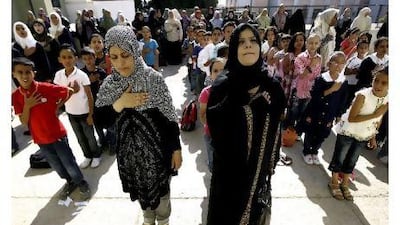TRIPOLI // Within days of the death of Muammar Qaddafi, students at the Salam Hidli Al Mehan Al Chamila technical high school in Tripoli had their revolutionary handicrafts out on display for sale.
Speakers boomed post-Qaddafi tunes across the school's courtyard as students waved the new Libyan flag or brandished posters celebrating the new freedom. The walls of the courtyard were covered in portraits of people killed in the civil war.
Long tables along the perimeter were loaded with handmade goods - hats, books, cake, posters, purses - all in some way or other sporting the green, black and red of Free Libya.
"I was selling a necklace and bags and pictures to take the money and give it to the poor people whose houses are broken from Qaddafi," said Epthal Abu Bakker, 17, a student at the school.
Change is the watchword in Libya since the death of Qaddafi. A new prime minister has been named, a new transitional government is imminent and new portraits of fallen revolutionaries replace those of Qaddafi in public spaces.
Even more profound changes are happening in the nation's schools.
Over his more than four decades of dictatorship, Qaddafi used the schools to promote his ideology to citizens.
Now, the National Transitional Council has the huge task of purging all subjects, from primary to university level, of the dictator's influence.
Epthal's major at this school is fashion design but it was through her other subjects that she was exposed to Qaddafi - history, geography and Al Mujtama Al Jamahiri, a subject entirely dedicated to the study of Qaddafi's treatise on politics and civic life, the Green Book.
"We were obliged to read it," she said. "Every year, you read the same book about Muammar. They always talk about Muammar Qaddafi. He is the leader. He is the everything in the world, like he is a god, you know? Now we are free. We can say anything we want."
While Epthal and her school friends are embracing that freedom with their needles and thread, Libya's transitional Ministry of Education also has a lot of work to do.
"We don't want anything that signifies him, neither his name, his family, nor his symbols and signature green colour," said Mohammed Sawi, the director of the National Curriculum Reform Office in Tripoli.
Mr Sawi heads a team of 160 educators charged with rewriting curriculums throughout Libya's public schooling system.
First, subjects such as the one dedicated to the study of the Green Book have been cancelled. Schools already have burnt stockpiles of the book and only a few remaining copies of it lie among the piles of obsolete textbooks that line the corridors of the curriculum reform offices.
The next stage involves symbolic changes, such as removing the word "Jamahiri," a term invented by Qaddafi to describe his notion of a republic, as well as his regime logo from the covers of textbooks. Passages referring to him in school texts are also being taken out.
"The cover of the book, we changed it from 'Jamahiri' to just 'Libya'," said Amal Taher, who is helping to reform English-language curriculums.
Depending on the subject, more severe cuts and changes are required. In geography, maps were used to confuse people, not inform them.
"Qaddafi was afraid they could revolt at any time, so it was important that they feel far from each other," said the geographer Mahmoud Al Chawadi, who is working on geography syllabuses.
"So in the maps he created a big separation between east and west Libya to disorient people and make sure they felt divided, not united."
By January 14, the new curriculums and textbooks will be rolled out to the country's estimated 1 million students. But the larger goal - removing the lies Qaddafi preached through Libya's schools for four decades - may take quite a long time.
"I think a lot about the future of the students and the children of this country," said Brahim Al Hajaji, the principal at Epthal's school. "The big challenge is the little kids who love Qaddafi and don't know why they love him."
It was such pupils who threatened and beat up Epthal whenever she would criticise Qaddafi at school.
"They told me, 'Who are you to talk about the leader? You are nothing. You are only a bug in our eyes'," she said.
Now Epthal is free to express her opinions.
"We have to know. The children have to know what they missed before," she said.
"We have to learn about our grandparents' time and we have to understand how Qaddafi came to power and why he did what he did."

